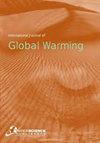Climate change as a risk to human security: a systematic literature review focusing on vulnerable countries of Africa - causes and adaptation strategies
IF 1
4区 环境科学与生态学
Q4 ENVIRONMENTAL SCIENCES
引用次数: 1
Abstract
The main purpose of this research is to systematically review the literature to understand how climate change influences stability and human security. The results identified from the bibliometric analysis allowed the identification of four dominant themes in the literature explaining the climate change and human security nexus: 1) food security related to agricultural systems; 2) water security associated with water scarcity and management; 3) humanitarian crises, emphasising conflict and climate migration; 4) adaptation and mitigation strategies. The results underline the ineffectiveness of current responses to climate change, suggesting the urgency of action to reduce its impact on communities most prone to the effects, particularly in fragile states in Sub-Saharan Africa. The study highlights some recommendations to policy and institutional leaders for a sustainable adaptation at the social, ecological, and economic dimensions. Additionally, this paper provides a theoretical contribution by explaining the nexus of climate change, human security, and conflict, proposing a new dimension for the concept of human security - ecological security.气候变化对人类安全的威胁:以非洲脆弱国家为重点的系统文献综述——原因和适应策略
本研究的主要目的是系统地回顾文献,以了解气候变化如何影响稳定和人类安全。从文献计量学分析中确定的结果可以确定四个主要主题,以解释气候变化和人类安全关系:1)与农业系统相关的粮食安全;2)与水资源短缺和管理相关的水安全;3)人道主义危机,强调冲突和气候移民;4)适应和减缓战略。研究结果凸显了当前应对气候变化措施的有效性,表明亟须采取行动,减少气候变化对最容易受到影响的社区的影响,特别是在撒哈拉以南非洲的脆弱国家。该研究向政策和机构领导人提出了一些建议,以便在社会、生态和经济层面实现可持续的适应。此外,本文还通过解释气候变化、人类安全和冲突之间的关系提供了理论贡献,提出了人类安全概念的一个新维度——生态安全。
本文章由计算机程序翻译,如有差异,请以英文原文为准。
求助全文
约1分钟内获得全文
求助全文
来源期刊

International Journal of Global Warming
ENVIRONMENTAL SCIENCES-
CiteScore
1.80
自引率
11.10%
发文量
86
审稿时长
6 months
期刊介绍:
IJGW aims to bring all disciplines together for local/global solutions to combat global warming and its consequences. It focuses around nine main pillars: better remediation, avoidance, efficiency, cost effectiveness, design, resource utilisation, environmental quality, energy security, and sustainable development. It also address issues related to global changes as a direct/indirect result of climate modification and strategies for adaptation to such changes. IJGW covers disciplines as diverse as engineering, climate science, ecology, economics, education, management, information sciences, politics, strategy development, etc.
 求助内容:
求助内容: 应助结果提醒方式:
应助结果提醒方式:


